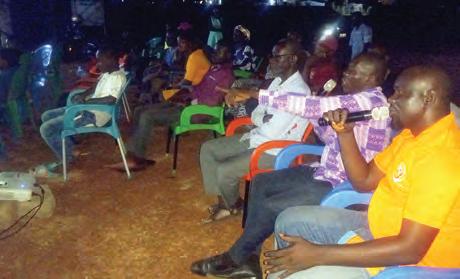
2 minute read
Filling in the Blanks
by REV. DR. MICHAEL ZEIGLER, Speaker of The Lutheran Hour ®


Can you finish this quote?
“May the Force __ ____ ___.”
Or this one?
“Help me, Obi-Wan Kenobi, you’re my only ____!”
What about this conversation?
[Villain] “Obi-Wan never told you about your father.”
[Hero] “He told me enough. He told me you killed him!”
[Villain] “No, _ __ ____ ______.”
If you are stumped, go to your local movie theater. Ask the first five people you see to try filling in the blanks. I bet they will say: “be with you,” “hope,” and “I am your father.”
People can fill in those blanks because the story from which they come (Star Wars) is part of popular culture. Two thousand years ago, the “Star Wars” of that time was a story called The Odyssey. It was an adventure set in the land around the Mediterranean Sea and centered on a deathdefying hero called King Odysseus. Now, when a man named Mark wrote his biography of Jesus of Nazareth, the Odyssey-story had been around for hundreds of years. In Mark’s day, people could quote King Odysseus like we quote Luke and Leia. So, Mark wrote his narrative about Jesus with many parallels to The Odyssey. Dr. James Voelz notes how these parallels help explain why (humanly speaking) the Jesus-story “resonated throughout the Mediterranean world and in less than three centuries conquered the Roman Empire.”1
To be clear, Mark did not concoct a story about Jesus, copying The Odyssey. No, he reported Jesus’ words and deeds in history. And, when he put it together, he did it in a way that would meet people where they were, like how Paul quoted a pagan proverb and a popular poet before preaching the resurrection of Jesus (see Acts 17:28). Paul and Mark met people where they were. They wanted everyone to know that our good Creator has not abandoned us. Instead, He has intervened to meet us in His beloved Son, Jesus.
In Jesus, God personally took on our humanity. He meets us where we are. But He doesn’t leave us there. God meets us in our flesh, in our language, in our culture to complete our deepest longings and to correct our dangerous distortions. For example, The Odyssey expressed a cultural longing for the wise king to return and set all wrongs right. And Mark tells the Jesus-story with echoes of The Odyssey to complete that longing. At the same time, Mark corrects its distortions. The Odyssey tells of warring gods meddling in the affairs of a warring, human king. That king tries to conquer by force—by mastering his circumstances and slaughtering his enemies. In contrast, Mark tells of the One, Creator God—the Almighty, loving, Father God, who sends His royal Son to become a servant. God’s Servant-King conquers the world not by force but by self-sacrifice—by dying for His enemies, and rising for them.
As we carry the message of King Jesus to new generations and cultures, we look for ways to connect with them. We sacrifice our preferences to be interested in what interests them, to meet them where they are (see 1 Corinthians 9:19-23; Philippians 2:3-4). There is much in their songs, stories, and longings we can affirm (and learn from). At the same time, every cultural expression is deficient. We all need Jesus to fill in the blanks for us, to tell us who our Father really is. He is our only hope, but He is more than just a force. That’s why we say, counterculturally, “The Lord be with you.” u
1 James Voelz, Mark, Vol. 2 (St Louis: CPH, 2019), p. 600.
Raziel and his two younger siblings have grown up participating in LHM–Panama’s Project JOEL activities at their school. Raziel loves reading the Bible and devotionals, and he enjoys working with games and puppets. Encouraged by the Gospel, Raziel and his siblings aspire to be missionaries when they grow up.
Help us continue to share the Gospel with people like Raziel and his siblings by visiting LHM.ORG/GIVE or sending a gift in the enclosed envelope.











